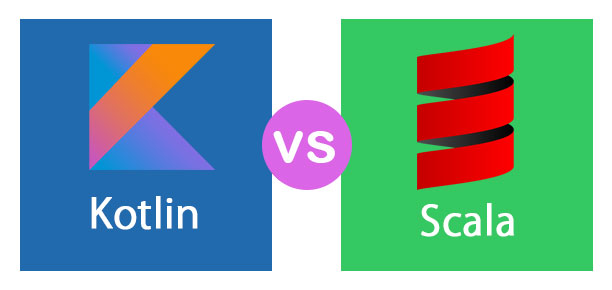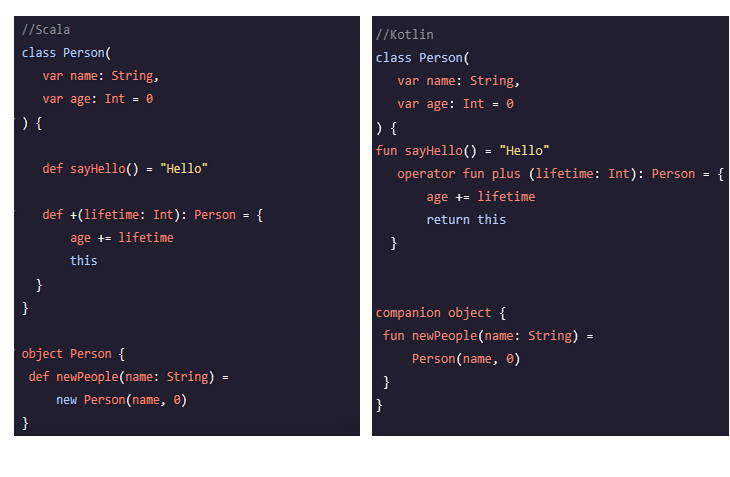Updated March 14, 2023

Difference Between kotlin and Scala
Kotlin is a JVM language that operates on the java virtual machine while Scala is an open-source programming language; they both are the most widely used language but poses differences in terms of speed, i.e. Kotlin takes less time in the compilation as compared to Scala and has fewer community groups for support, Scala supports for pattern matching and macros whereas these features are not available in Kotlin along with these there is a difference in the size of code, i.e. the code size of Kotlin are smaller as compared to Scala.
What is Kotlin?
- Kotlin a JVM language that implies it operates on the Java Virtual Machine and compiles down to Java byte code. As a language, it’s very similar to Java. So if you’re a Java programmer already, then using Kotlin is not a large step, unlike, say, something like Scala, where you might have to learn many more new concepts.
- In Kotlin, it’s fairly easy to get started straight away just by applying what you already know from the Java language. Kotlin is an object-oriented language. So we can create classes. We have methods within those classes. We can new-up instances of those classes. We can create objects. It’s a standard object-oriented language.
- However, Kotlin was also designed to be a functional language from day one. Well, as a functional language, Kotlin has support for higher-order functions. So I can store functions in collections. I can pass a function as a parameter to another function. And I can return functions from functions. So functions within Kotlin are treated as first-class citizens.
- Kotlin has less ceremony than Java. So in Kotlin, if I want to create a property, I just declare a file or a var, and that will declare me a property that’s either read-only or read-write. There’s no need to declare a variable and then have a get method and a set method. Under the covers, Kotlin will generate getters and setters, so those properties are usable from Java. But that’s just one example of where you need less code in Kotlin to do the equivalent thing in Java.
What is Scala?
Scala is an open-source programming language released under the BSD or Berkeley Software Distribution license. It was created by Martin Odersky in 2001 but was not publically released until two years later. Subsequently, version 2.0 was released in 2006, with the current stable release being 2.13.0 as of April 2019
Key features of Scala
- Object-Oriented Scala
- Type System
- Function and Closures
- Custom Control Structures
- Traits
- Collections
Head to Head Comparison Between Kotlin and Scala (Infographics)
Below are the top 10 differences between Kotlin vs Scala.
Key Differences between Kotlin and Scala.
Let us discuss some of the major differences between Kotlin vs Scala.
1. Null Securely: Scala benefits a choice monad for this reason, which could occur in a single among two states: Some (x) or perhaps none of them. In Kotlin to get error safety, new different kinds of nullable as well as, non-null variables are generally added, that null cannot be written. In general, both the Kotlin approach and the real program are more understandable and succinct.
For Example
2. Classes of data: Scala benefits case classes that usually support techniques for creating new instances and declaring properties. Kotlin gives the related group of features generally, but its classes are more desirable to get dealing with Java-frameworks since it appears like JavaBean.
For Example
Scala possesses issues with the syntax with the infix as well as postfix operators. Kotlin is a more official language, which usually enhances the readability of the program and eliminates the extreme ambiguity of this syntax.
3. Implicit conversions in Scala may considerably replace the behaviour with the program once importing – it is hard to figure out precisely which variable will probably be exceeded towards the function. Nevertheless, the problem is fixed once doing work in that IDE.
4. Collections
Scala produced unique (extremely high level) mutable, immutable well as parallel collections.
- Vector, List, Stream, Map, Set, etc.
- Scala collections could be expanded with minimal work
- Interoperability with Java is usually accomplished with the implicit conversions
scala.collections.JavaConversions
Kotlin depends – for the moment – on Java collections with a few improvements:
- Create methods: listOf(1,2,3), mapOf(“a” to 1)
- A rich group of higher-order functions (Zip, windowed, fold)
- Additions with numeric collections (sum(), average())
- immutable Opinion of mutable collections
Scala communicates common programming patterns within a succinct, elegant as well as, type-safe approach.
Kotlin features
- Maximum decrease of boilerplate
- Safety by using null-types as well as immutability
- Extensibility by using extension functions
Scala: Easy integration of object-oriented as well as functional features.
Kotlin: Good concentrate on interoperability with the Java and also Java Frameworks.
Scala: Big data – Large volumes, streaming.
Kotlin: Maintainability as well as Regularity at the business level.
Scala: Complex domain.
Kotlin: Easy to learn as well as implement.
Kotlin vs Scala Comparison Table
Let us discuss the topmost differences between Kotlin vs Scala.
| Basis for Comparison | Kotlin | Scala |
| According to StackOverflow | Most loved language in 2018 -2019 Kotlin is ranked 2nd | Most loved language in 2018 – 2019 Scala is ranked 12th |
| Android language | Kotlin is an official Android language. | Scala is not wildly used for Android. |
| Compilation Speed | Fast Compilation speed compared with Scala. | Compilation speed is slow compared with Kotlin. |
| Community Support | There are fewer libraries, blogs, and guide, in other words, smaller sized support community. | Larger community Support compared to Kotlin. |
| Pattern Matching | Kotlin Does not support pattern matching completely. | Complete support for Patter matching, macros as well as higher-kind forms |
| Code length | Kotlin Codes are usually short, succinct also to the purpose. | Scala Codes are usually larger. |
| Release Year | Feb 2012 | April 2003 |
| Companies use | Google adopts Kotlin, Uber, Amazon, Netflix, etc. | LinkedIn, Twitter, Airbnb uses Scala. |
| Job Factor | Less Kotlin jobs are available in the market. | More Scala jobs available in the market |
| Language Beliefs | Simply object-oriented language with the functions as first-class citizens | Multi-paradigm programming language |
Conclusion
- As you may compare any kind of programming language, with regards to determining which usually language can be enhanced, there is no single solution that is likely to help everybody.
- If Scala or Kotlin shows an improved Java option for you particularly can be eventually likely to be based upon what precisely you are trying to find within a programming language, the way you intend on applying this new language, as well as your purpose to getting off Java, to begin with.
- Should you be completely fairly pleased with the characteristics that Java provides but annoyed by the quantity of boilerplate program you need to write, you might wish to consider Kotlin to get a spin. Nevertheless, should you be fed up with Java by itself and are also wanting even more progressed as well as effective features, especially if prepared to deal with big data, after that Scala gives the solid substitute for Java — should you be ready to spend a little more time arising to help you speed along with your new programming language.
Recommended Articles
This has been a guide to Kotlin Vs Scala. Here we also discuss the key differences with infographics and comparison table. You can also go through our other suggested articles to learn more –



